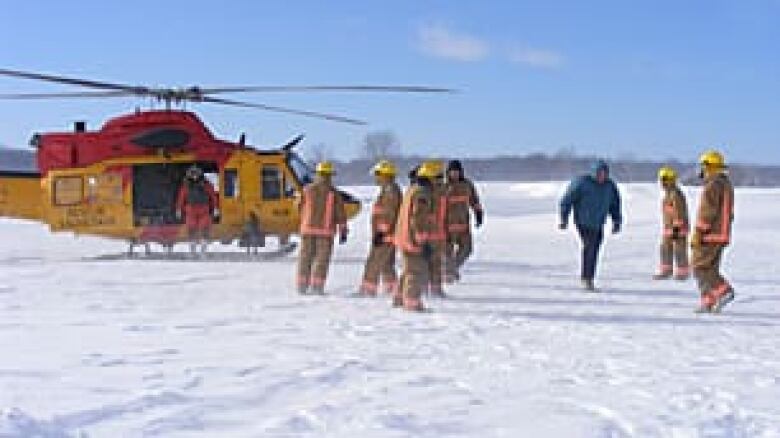Sarnia drivers rescued from snowed-in highway
2 Griffon helicopters fly motorists to warming stations
Rescuers in military helicopters, snowmobiles and heavy trucks have freedthe more than 200 stranded motorists who had been stuck on southwestern Ontario's Highway 402 since a heavy snowstorm hit Monday.
Ontario Provincial Police confirmed Tuesday night that officers and Canadian Forces personnel had removed 237 people fromtheir stranded vehicles on the highway near Sarnia.
Estimates initially suggested that about 300 peoplewere trappedalong a 30-kilometre stretch between the Sarnia city limits and KerwoodRoad, just outside Lambton County.But police said that figurewas based on the number ofvehicles abandoned. Some people escaped on their own.
The OPP said officials checked 200 tractor trailers and 124 cars that were trapped in the deep snow along the highway. So far, there have been no reports of missing people in the storm.
Temperatures, snow, highway worked against drivers
Powerful winds, heavy snow and cold temperatures were the driving forcebehind the nasty weather, according to CBC meteorologist Nick Czernkovich.
"What's happening is you're getting the cold air rushing over the lake, it picks up the moisture, and boom," he said.
Wind gusts of up to 78 km/h were recorded at the Sarnia airport. Nearby Pretoria recorded 32 centimetres of snow since Monday.
Czernkovichsaid while snowsqualls are not uncommon, a combination of three elements made the situation in southwest Ontario particularly daunting.
"The combination of the cold temperatures, which meant moresnow; the winds, which led to blowing snow and whiteouts and drifting snowand because Highway 402 parallels the shoreline of Lake Huron."
The snowsquall covered most of the highway. Because there are no majorexit routes from Highway 402 that lead in a different direction, motorists were basically trapped in the storm with nowhere to escape, he said.
"Once you get stuck on Highway 402, you're in that snowsquall the entire time," he said.
Defence Minister Peter MacKay saidtwo Griffon helicopters were used for the rescue, while five others were on standby in an effort co-ordinated by Ontario Provincial Police. The military helicopters rescued 66 stranded motorists and performed one medical evacuationfor treatment this afternoon.
Motoristspicked up by helicopter were airlifted to warming stations provided by police.
OPP pickedup people as they came across them, using a plow thattoweda school bus.
A Hercules aircraftflewover the area to monitor conditions and a Canadian Forces ground battalionwas on standby with heavy trucks to rescue more drivers,ifthe OPP requested more assistance.
Some motorists had been stuck in snowdrifts along Highway 402 since Monday afternoon.MacKay said some didn't want to leave their cars.
Policeestablished an emergency operations centre andworked with Emergency Management Ontario (EMO) to co-ordinate provincial assistance.
The military responded to a request for assistance from the OPP just before midnight Monday, after Lambton County officials declared a state of emergency.
"We'reworking together to make surethis rescue initiative is underway full-steam," said Rektor.
Rektorsaidemergencyworkers had been on the phone with someof the people who were forced to spend the night in their vehicles.
"Other than being obviously frustrated by the situation, their health is in good condition and they're just sitting there, biding their time and waiting for rescue,"Rektor said.
The crisis workers gave the stranded travellers tips about staying warm and safe, and advised them to pool their resources while they waited for rescue crews who were struggling with extreme cold, snow and high winds. Motorists were told to make sure their car exhaust was clear of snow and that fresh air got into their vehicles for fear of carbon monoxide poisoning.
The military recommended motorists stay in their cars and not try to attract a helicopter pilot's attention.
"They're just going to have to ride this out until we canget there,"Rektor said earlierTuesday.
P.O.V.:
Are you prepared for winter driving emergencies? Do you keep an emergency kit in the car?Let us know.
Several emergency vehicles and snowplows werestuck on the road, Rektor said, so rescue teams were using snowmobiles and all-terrain vehicles to tryto reach people. He said they were limited by "zero visibility and the deep snow."
Emergency Management Ontarioissued what it called a "red alert" for the area between Sarnia and London because heavy snowfall was causing zero visibility. Police recommended people "stay off all the roads" and advised against any unnecessary travel between the two cities.
Shelters set up
Local reporter Heather Wright said the municipality set upseveral shelters and warming centresto deal with people who couldn't get to their homes.
"There were countless more who just basically walked up to the nearest house where their car was stranded and said, 'Could I stay for the night?' and people opened their homes to them," Wright said.
Todd Case, the mayor of Warwick Township, said he spent the night at a local hall where about 100 people sought shelter from the fierce winter weather.
Send us your pictures
"Most of thefolks were brought in from the 402," he said. "They're thankful to be off the road, they're thankful to have a meal provided and a roof over their head they're very positive, considering what they've been through."
He said many of the people were stranded for six or seven hours before they made it off the road.

Case said some snowplows were back on the road Tuesday morning, but noted that visibility was still very poor.
Tracy Hunt, who made it off the highway and spent the night in a nearby office building, said she couldn't see anything when she got out of her vehicle.
"Each of us got out of our cars, we were talking amongst each other and you couldn't see anything the houses around us, nothing," shesaid. "But then these folks came with a tractor and led us to where we are now."
With files from The Canadian Press












_(720p).jpg)


 OFFICIAL HD MUSIC VIDEO.jpg)
.jpg)



























































































